When we are just choosing our life path in our youth, we often have to make compromises: compromises caused by our learning ability, financial capabilities, and all sorts of other factors. But youth is different from any other age in that sometimes it doesn’t accept compromises…
Here is the user WorldMap24, the author of our story today, who also faced a similar case when she and her teen son began discussing options for his further education. In short, the boy dreams of becoming an oncologist, and his mom has serious doubts… no, not in her son himself, but in the various circumstances around this.
More info: Mumsnet
The author of the post is a mom of a high-schooler who is choosing his options for further education now, aspiring to become an oncologist
Image credits: freepik / Freepik (not the actual photo)
However, the mom has some serious concerns about this path for her son’s education
Image credits: WorldMap24
Image credits: Jeswin Thomas / Pexels (not the actual photo)
Firstly, the boy is a good student but his grades are still not that high, and secondly he doesn’t quite enjoy all of the disciplines required
Image credits: WorldMap24
Image credits: Andy Barbour / Pexels (not the actual photo)
And the last but not the least, the boy is a frequent fainter, so mom doubts he could cope with it while studying and then working
Image credits: WorldMap24
So the lady is in two minds on whether to dissuade the son or to encourage him to chase his dream
So, the Original Poster (OP) has a schooler son in year 11 (the author lives in the United Kingdom) and they are currently thinking about continuing his education next September, because the applications need to be in by the upcoming January.
And here the mom and son have a problem – the boy already announced several months ago that he wants to become an oncologist and, accordingly, go to medical school. The parents discussed other options of working in the National Health Service with him, such as dietician, physiologist and pharmacist, but the teen definitely wants to become a doctor.
Well, the mother has some concerns about this. Firstly, her son’s grades – they are not as excellent as required. That is, the boy is a good student, but not brilliant. Secondly, for a medical career, you need to choose in-depth study of biology, chemistry and math. And of these three disciplines, the boy really enjoys biology only.
Finally, a medical education implies that a student will sooner or later encounter someone else’s blood and everything related. And the author’s son is a fainter, as the mother admits. For example, he tends to faint during injections. According to her, this is a family trait – the OP herself has noticed something similar in herself more than once.
So the woman is afraid that her son, faced with the harsh reality of medicine, will sooner or later retreat and, thus, lose precious time and resources. However, she’s also hesitant to dissuade her son from his dream (though she herself isn’t sure whether it is a dream or a short-term passion) – after all, it is the ability to dream that makes us human in many ways.
Image credits: Racool_studio / Freepik (not the actual photo)
“In fact, many of us often have a problem with choosing our career path, and the choice made in early youth is not always the only right one,” says Volodymyr Nemertsalov, a school teacher and principal from Odessa, Ukraine, whom Bored Panda asked for a comment here. “That’s why I can easily understand the situation in this family.”
“In any case, if getting a degree here involves serious financial investments from the family, perhaps it’s worth thinking again about how ready this young man is to continue his education in this particular field. In the end, he will still be able to make up for the time, but he will hardly be able to make up for the money spent.”
“After all, medicine is an incredibly broad field, and there are plenty of specialties that are not directly related to the things that make him faint. In addition, there are specialists who can provide career guidance for a teenager. So if I were his mother, I would advise seeking professional advice. That would be the best thing,” Volodymyr concludes.
Folks’ opinions in the comments to the original post were also divided. Some believe that a passion for a chosen medical specialty can disappear as quickly and unexpectedly as it actually appeared. “Have a look at uni requirements for nurses, physios, nurse practitioners, etc,” someone aptly wrote. “There are plenty of non-medical NHS roles too.”
Others sincerely believe that having a dream is cool and noble, and urge the mom to simply encourage her son in the chase for his dream. “He’ll have to adjust his plans if he doesn’t get the grades, but if it were my [children] I wouldn’t want him to feel unsupported,” another responder said. So which point of view do you, our dear readers, lean more towards?
The internet was very divided on this case: some folks suggest encouraging him to pick another healthcare specialty, but some just urge mom to support the son’s dreams
By choosing those subjects for A level (which is what University admission is based on) he is not really limiting himself to studying medicine, pretty much any STEM subject would be open to him. If he does get in, then the particular speciality he chooses need not be determined until a few years (5?) down the line, and it's worth noting that a lot of first and second year medical courses overlap with other life sciences, like pharmacology (which is what my wife did, sharing several courses with the medics) so even if he changes his mind after the first year, and many do, he's still likely to be able to switch to a related course. Plus, I personally have worked with hundreds of doctors who chose, once qualified to embark on careers in research rather than just sticking to actually treating patients. So I'd say encourage him all the way. even if he doesn't achieve his current objective it's a worthwhile step in the right direction.
Totally agree, there are so many options open to him with STEM courses besides Dr. that he may not have even considered. Part of Uni is finding out what career fit is best for you.
Load More Replies...How? This is a 15-16 year old kid, with no training, expertise, or qualifications. Not to mention data protection laws, liability insurance issues. No medical professional is going to/be allowed to let some random kid follow them round seeing people in their most vulnerable moments
Load More Replies...Here's the thing: Is it more important for a kid to feel supported or to be supported? Often, those can and will be the same thing; however, in this situation, they are not necessarily the same. Actual support would mean helping him understand his limitations and find a way to set goals that are achievable. I teach high school and have to help students who get Bs but want to apply only to Ivy League schools.
I think there's a way to be supportive, but inject realism. Supportive takes the form of "Whatever you set your mind and efforts to, I have no doubt you can achieve, and I will do anything to help you in that." Balance that with realism: "Your marks will not get you accepted to the program you want, so you probably need a strategy to get those marks higher. Do you have a plan for that?" I'm not a fan of deciding that teenagers have limitations of ability, but think it's fair game to let them know when they have limitations of strategy or effort. (Yes, I know some kids will never be able to get A's in math, but I fear too many of them aren't shown paths to achieve that.).
Load More Replies...He can still step it up and get better grades. Help him find a mentor and get him a shadowing opportunity. He doesn't have to be a physician though, he could go the oncology route as a nurse, a biologist, a pharmacist, or something else, and research is huge in that department, which includes a wide variety of professions too. Have him look into that as well, but present it as a backup plan in case he doesn't make it to med school. The pre-requisites would still help him if he's interested in that field.
My daughter couldn't get in to Med school with 3 A's and a B at A level, but she was determined. She studied Biochemistry, got a first and THEN applied again to med school. She's now a registrar. If he doesn't get the grades, he won't get in, but if he gets a good related degree and remains determined, he might.
Debby Keir, I was going to suggest that route too. It takes longer, but applying to med school with a university degree is more attractive than someone just out of school.
Load More Replies...It certainly doesn't sound like being a doctor would be the ideal career path for this young man, and maybe not even a possibility, but I think the mother's best option would be to be supportive, without being enthusiastic about it. Actively discouraging him may be counter productive, and make him dig in his heels. I say that mainly because I remember that when I was her son's age I thought I had it all figured out, and wasn't receptive to outside advice. I of course don't know this young man, but that condition is not uncommon in young people.
I became a nurse clinician because my good grades were not enough for med school. Been a nurse for almost 20 years and I’m great at what I do and I’m thriving. Not being able to go to med school was a great blow and I felt like a failure for many years. But now, I wouldn’t want it any other way and I’m proud of my career. I left intensive care 12 years ago for addiction medecine and I now run an OAT clinic I helped create. I’m working on another project of creating an elderly care center for older homeless people who use psychoactive substances and need care. There are other ways to thrive in healthcare other than becoming a doctor.
To me it's simple: This is what he wants, so let him try. Parents sometimes act like failure or even pivot are the worst thing that can happen to their child... They're not. It's a learning experience and you'd be wrong to try shielding them from this kind of risk. Talk to them, but make sure to NOT project your worries and "worst case scenario" ideas onto them! You can explain what's needed for succeeding on the path to becoming a doctor - good grades in certain subjects, long working hours, upping his game overall, etc. - but the ultimate choice should belong to the person that will actually embark on this path. Don't discourage - teach. The "worst case scenario" is that they'll realize at some point that it's not for them and will look for a different road. Is that so bad? We all had some ideas about who we'd like to be when we were teenagers, and most of us changed the career route at least once, if not more. You don't want your kid to resent you for not letting him go for a dream.
I wanted to be a nurse when I was younger, but I knew I couldn't do Maths at a higher level. I failed my Maths GCSE. I now work for the ambulance service in the control room. Whilst it's not my chosen field, I'm still within a medical (ish) environment and enjoy my job, plus I don't get vomited on!
HUGE pinch of salt with this one. It's from Mumsnet, an alt-right echo chamber of TERFs who think it's okay to orchestrate every single moment of their kid's lives to ensure they all come out cis gendered and heterosexual. Or they don't come out at all. I'd bet all the money in my pockets that this kid is being stifled with religion and intolerance and will actually blossom and achieve their goals as soon as they're away from the hatred and intolerance of the OP.
OP is from England/Great Britain. I could tell that from the OP using the words "year 11, sixth form / college, mum and rubbish" as these are the common terminology / words they use there.
Load More Replies...Organise for him to do a work-experience placement with a doctor or at least shadow them for a week. That would clear up some of the simpler questions regarding how he deals with the corporeal side of things
That doesn't usually work. My daughter took a gap year and worked as a nurse aide and STILL didn't get in - see my comment above.
Load More Replies...How about offering to get him tutoring if he needs it to maintain straight As? How about suggesting he talk to some of the teachers at his school and asking them if he can borrow the A-level textbooks for chemistry and biology to have a read through so he has an idea what the coursework will be like? How about suggesting talking to his careers adviser and/or the admissions team at a university to find out what he needs to do to make himself a good candidate for med school? How about encouraging him to put in the work towards his goal.
By choosing those subjects for A level (which is what University admission is based on) he is not really limiting himself to studying medicine, pretty much any STEM subject would be open to him. If he does get in, then the particular speciality he chooses need not be determined until a few years (5?) down the line, and it's worth noting that a lot of first and second year medical courses overlap with other life sciences, like pharmacology (which is what my wife did, sharing several courses with the medics) so even if he changes his mind after the first year, and many do, he's still likely to be able to switch to a related course. Plus, I personally have worked with hundreds of doctors who chose, once qualified to embark on careers in research rather than just sticking to actually treating patients. So I'd say encourage him all the way. even if he doesn't achieve his current objective it's a worthwhile step in the right direction.
Totally agree, there are so many options open to him with STEM courses besides Dr. that he may not have even considered. Part of Uni is finding out what career fit is best for you.
Load More Replies...How? This is a 15-16 year old kid, with no training, expertise, or qualifications. Not to mention data protection laws, liability insurance issues. No medical professional is going to/be allowed to let some random kid follow them round seeing people in their most vulnerable moments
Load More Replies...Here's the thing: Is it more important for a kid to feel supported or to be supported? Often, those can and will be the same thing; however, in this situation, they are not necessarily the same. Actual support would mean helping him understand his limitations and find a way to set goals that are achievable. I teach high school and have to help students who get Bs but want to apply only to Ivy League schools.
I think there's a way to be supportive, but inject realism. Supportive takes the form of "Whatever you set your mind and efforts to, I have no doubt you can achieve, and I will do anything to help you in that." Balance that with realism: "Your marks will not get you accepted to the program you want, so you probably need a strategy to get those marks higher. Do you have a plan for that?" I'm not a fan of deciding that teenagers have limitations of ability, but think it's fair game to let them know when they have limitations of strategy or effort. (Yes, I know some kids will never be able to get A's in math, but I fear too many of them aren't shown paths to achieve that.).
Load More Replies...He can still step it up and get better grades. Help him find a mentor and get him a shadowing opportunity. He doesn't have to be a physician though, he could go the oncology route as a nurse, a biologist, a pharmacist, or something else, and research is huge in that department, which includes a wide variety of professions too. Have him look into that as well, but present it as a backup plan in case he doesn't make it to med school. The pre-requisites would still help him if he's interested in that field.
My daughter couldn't get in to Med school with 3 A's and a B at A level, but she was determined. She studied Biochemistry, got a first and THEN applied again to med school. She's now a registrar. If he doesn't get the grades, he won't get in, but if he gets a good related degree and remains determined, he might.
Debby Keir, I was going to suggest that route too. It takes longer, but applying to med school with a university degree is more attractive than someone just out of school.
Load More Replies...It certainly doesn't sound like being a doctor would be the ideal career path for this young man, and maybe not even a possibility, but I think the mother's best option would be to be supportive, without being enthusiastic about it. Actively discouraging him may be counter productive, and make him dig in his heels. I say that mainly because I remember that when I was her son's age I thought I had it all figured out, and wasn't receptive to outside advice. I of course don't know this young man, but that condition is not uncommon in young people.
I became a nurse clinician because my good grades were not enough for med school. Been a nurse for almost 20 years and I’m great at what I do and I’m thriving. Not being able to go to med school was a great blow and I felt like a failure for many years. But now, I wouldn’t want it any other way and I’m proud of my career. I left intensive care 12 years ago for addiction medecine and I now run an OAT clinic I helped create. I’m working on another project of creating an elderly care center for older homeless people who use psychoactive substances and need care. There are other ways to thrive in healthcare other than becoming a doctor.
To me it's simple: This is what he wants, so let him try. Parents sometimes act like failure or even pivot are the worst thing that can happen to their child... They're not. It's a learning experience and you'd be wrong to try shielding them from this kind of risk. Talk to them, but make sure to NOT project your worries and "worst case scenario" ideas onto them! You can explain what's needed for succeeding on the path to becoming a doctor - good grades in certain subjects, long working hours, upping his game overall, etc. - but the ultimate choice should belong to the person that will actually embark on this path. Don't discourage - teach. The "worst case scenario" is that they'll realize at some point that it's not for them and will look for a different road. Is that so bad? We all had some ideas about who we'd like to be when we were teenagers, and most of us changed the career route at least once, if not more. You don't want your kid to resent you for not letting him go for a dream.
I wanted to be a nurse when I was younger, but I knew I couldn't do Maths at a higher level. I failed my Maths GCSE. I now work for the ambulance service in the control room. Whilst it's not my chosen field, I'm still within a medical (ish) environment and enjoy my job, plus I don't get vomited on!
HUGE pinch of salt with this one. It's from Mumsnet, an alt-right echo chamber of TERFs who think it's okay to orchestrate every single moment of their kid's lives to ensure they all come out cis gendered and heterosexual. Or they don't come out at all. I'd bet all the money in my pockets that this kid is being stifled with religion and intolerance and will actually blossom and achieve their goals as soon as they're away from the hatred and intolerance of the OP.
OP is from England/Great Britain. I could tell that from the OP using the words "year 11, sixth form / college, mum and rubbish" as these are the common terminology / words they use there.
Load More Replies...Organise for him to do a work-experience placement with a doctor or at least shadow them for a week. That would clear up some of the simpler questions regarding how he deals with the corporeal side of things
That doesn't usually work. My daughter took a gap year and worked as a nurse aide and STILL didn't get in - see my comment above.
Load More Replies...How about offering to get him tutoring if he needs it to maintain straight As? How about suggesting he talk to some of the teachers at his school and asking them if he can borrow the A-level textbooks for chemistry and biology to have a read through so he has an idea what the coursework will be like? How about suggesting talking to his careers adviser and/or the admissions team at a university to find out what he needs to do to make himself a good candidate for med school? How about encouraging him to put in the work towards his goal.

 Dark Mode
Dark Mode  No fees, cancel anytime
No fees, cancel anytime 




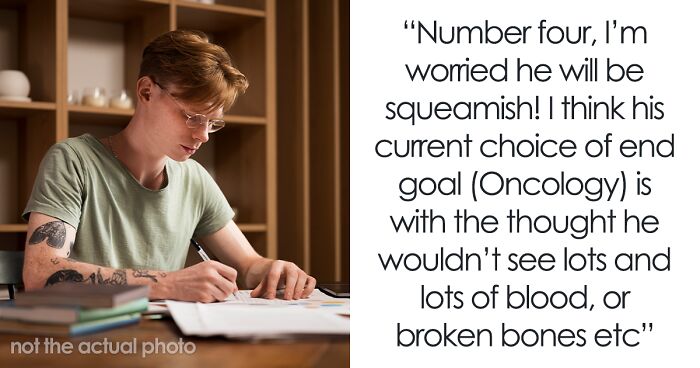























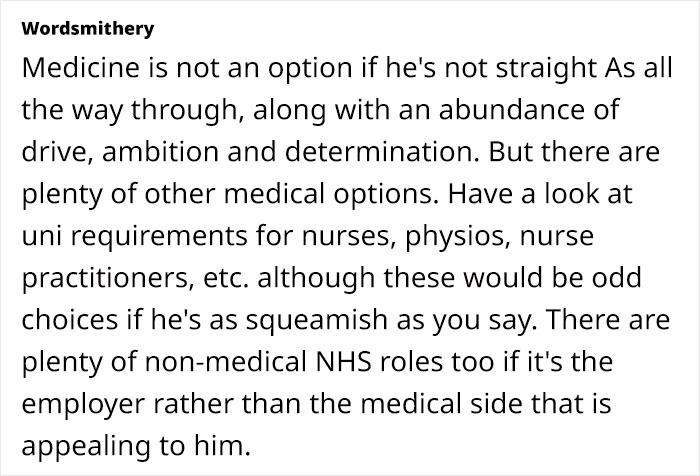
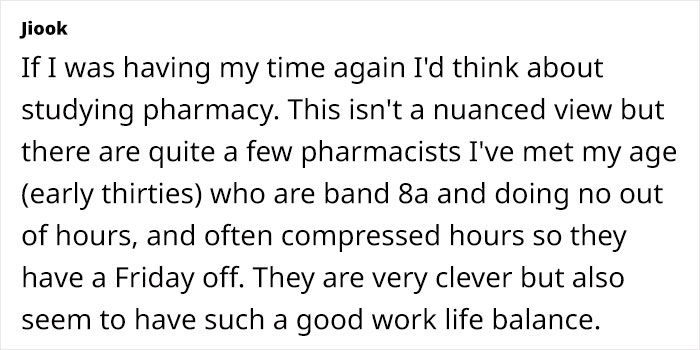

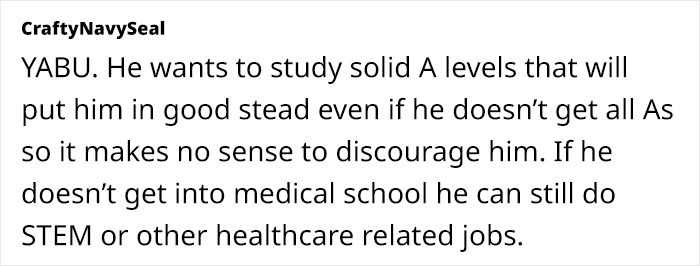
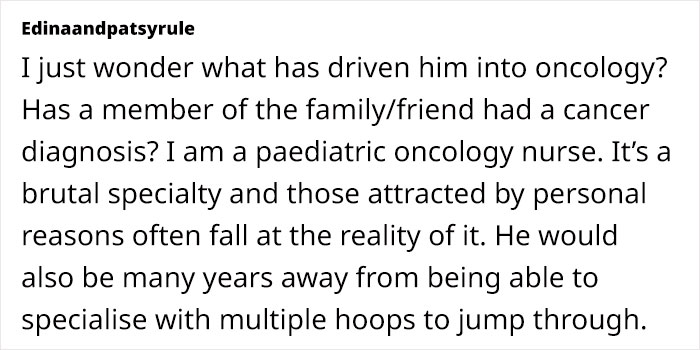
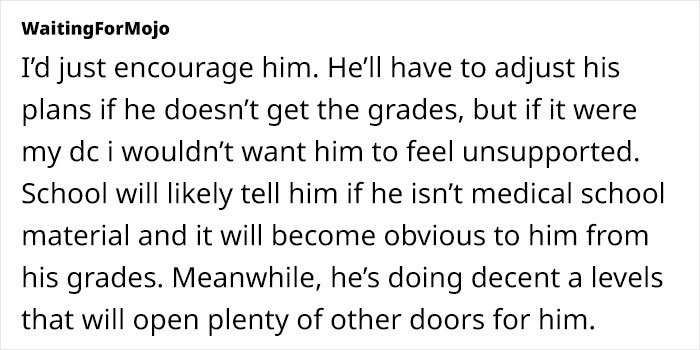
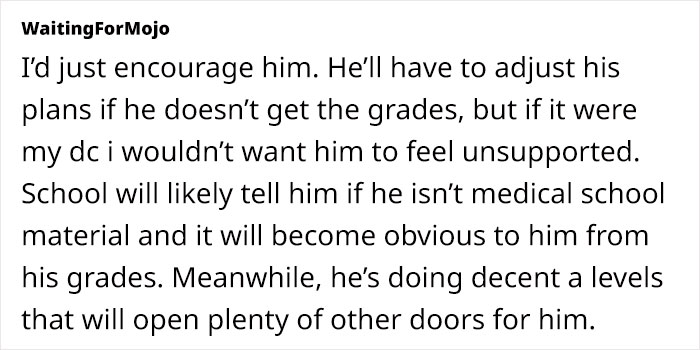
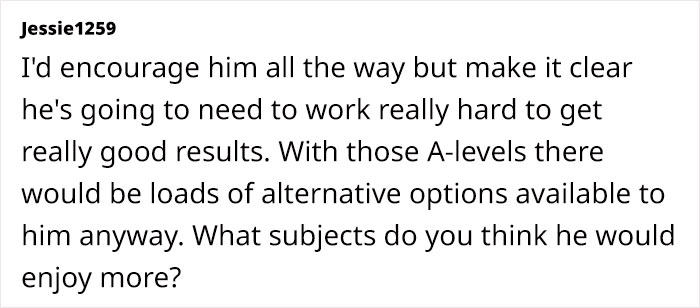
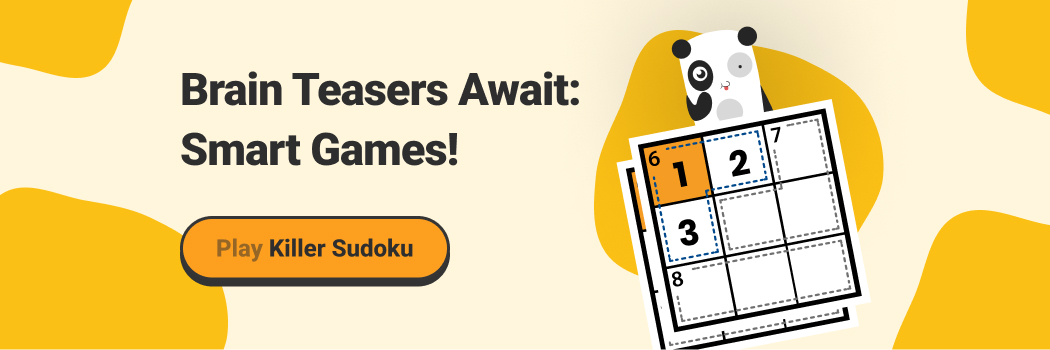















31
27